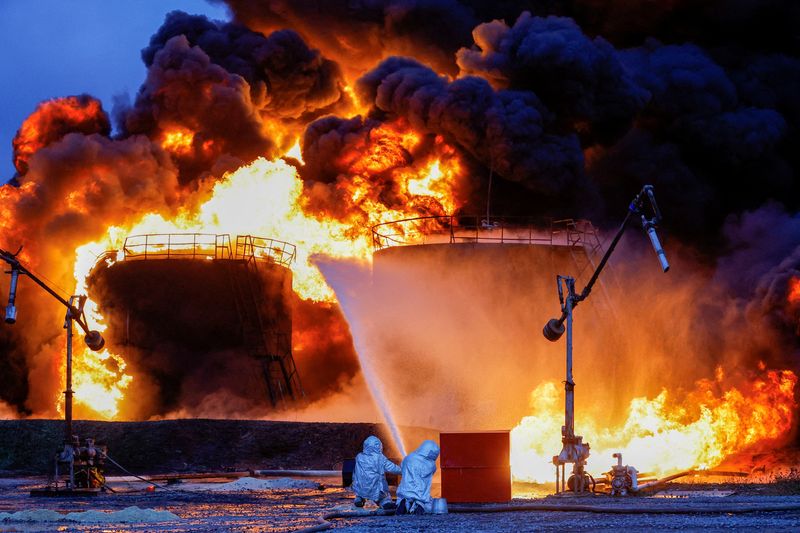By Sarah McFarlane and Valerie Volcovici
LONDON (Reuters) - The war in Ukraine is deepening the climate crisis at time when global greenhouse gas emissions are already running at a record high, according to report by carbon accounting experts who have tallied the overall impact of the conflict.
The report, which is due to be released on the sidelines of the U.N. climate summit in Bonn this week, calculates that the first 12 months of the war will trigger a net increase of 120 million tonnes of greenhouse gases, equivalent to the annual output of country such as Belgium.
A group of researchers led by Dutch expert Lennard de Klerk looked at a range of contributors to emissions, from fuel used by vehicles, to forest fires, to changes in energy use in Europe and the future reconstruction of buildings and infrastructure.
"We didn't expect the emissions of war would be so significant and it's not only the warfare itself that contributes to the emissions, but it's also the future reconstruction of the destroyed infrastructure," said de Klerk by phone from his home in Hungary near the border with Ukraine.
Carbon accounting will be in focus at the COP28 climate summit in Dubai this year as countries assess progress against climate goals agreed in Paris in 2015, and de Klerk said it was crucial military emissions were included.
"Emissions of conflicts and military emissions are often overlooked," he told Reuters.
"The aim that we all should have is to get to net zero by 2050, including the military, but if you don't know what the military emissions are, it's very difficult to start work on policies to reduce them," de Klerk said.
The report - Climate Damage Caused By Russia's War in Ukraine - was funded by the European Climate Foundation and the Environmental Policy and Advocacy Initiative in Ukraine.
GAS LEAKS AND BOMBS
According to the report, seen by Reuters, almost half of the net increase in emissions since the Ukraine war started in February last year are linked to the anticipated reconstruction of buildings, roads and factories damaged in the fighting.
About 19% of the emissions, meanwhile, come from military activities such as burning fuel in vehicles, making and firing ammunition and the construction of concrete fortifications.
The overall tally included greenhouse gas emissions from outside Ukraine linked to the conflict, such as gas leaks from the sabotaged Nord Stream pipeline, the rerouting of international flights, as well as the movement of refugees.
"If you look at the environmental costs of what's happening in Ukraine, that war is a catastrophe when it comes to carbon emissions," said James Appathurai, NATO's deputy assistant secretary general for emerging security challenges.
The report acknowledged there had been a drop in Ukraine's domestic economic activity due to the conflict, but said emissions related to those activities had mainly shifted to other countries.
It also concluded that the fall in emissions in Europe from lower flows of Russian gas and a drop in electricity usage due to higher energy costs had almost all been offset by increases in the use of oil, coal and liquefied natural gas (LNG).
The authors said the report followed guidelines on military emissions reporting developed by the Conflict and Environment Observatory charity, and relied on data sources including fossil fuel consumption figures, remote sensing through satellites, and open-source publications.
HARD TO DECIPHER
Ukraine's Ministry of Environmental Protection said it was important to initiate discussions about the impact of conflicts on the climate.
"Unfortunately, the impact of the war in Ukraine was not and will not be reflected in the reports and reviews of greenhouse gas emissions prepared annually by the Secretariat of the United Nations Framework Convention on Climate Change," the ministry said in an emailed statement.
Government reporting of military and conflict emissions to the United Nations is notoriously hard to decipher.
Opaque data on military activities, exemptions for emissions generated by armies while abroad, and annexed territories sometimes being double-counted all confused the picture, said carbon accounting expert de Klerk.
Other studies have attempted to calculate emissions from conflicts.
The U.S. military's war-related activities abroad between 2001-2018, including in Pakistan, Afghanistan, Iraq and Syria, caused 440 million tonnes of emissions, according to the Costs of War project at Brown University.

During the 1990-91 Gulf War, about 133 million tonnes of emissions were released when Iraq set fire to hundreds of oil wells as it retreated from Kuwait, according to a report by the International Institute for Applied Systems Analysis.
Britain, meanwhile, is funding a study into emissions related to the widespread use of concrete blast walls - known as Bremer walls - in Iraq.